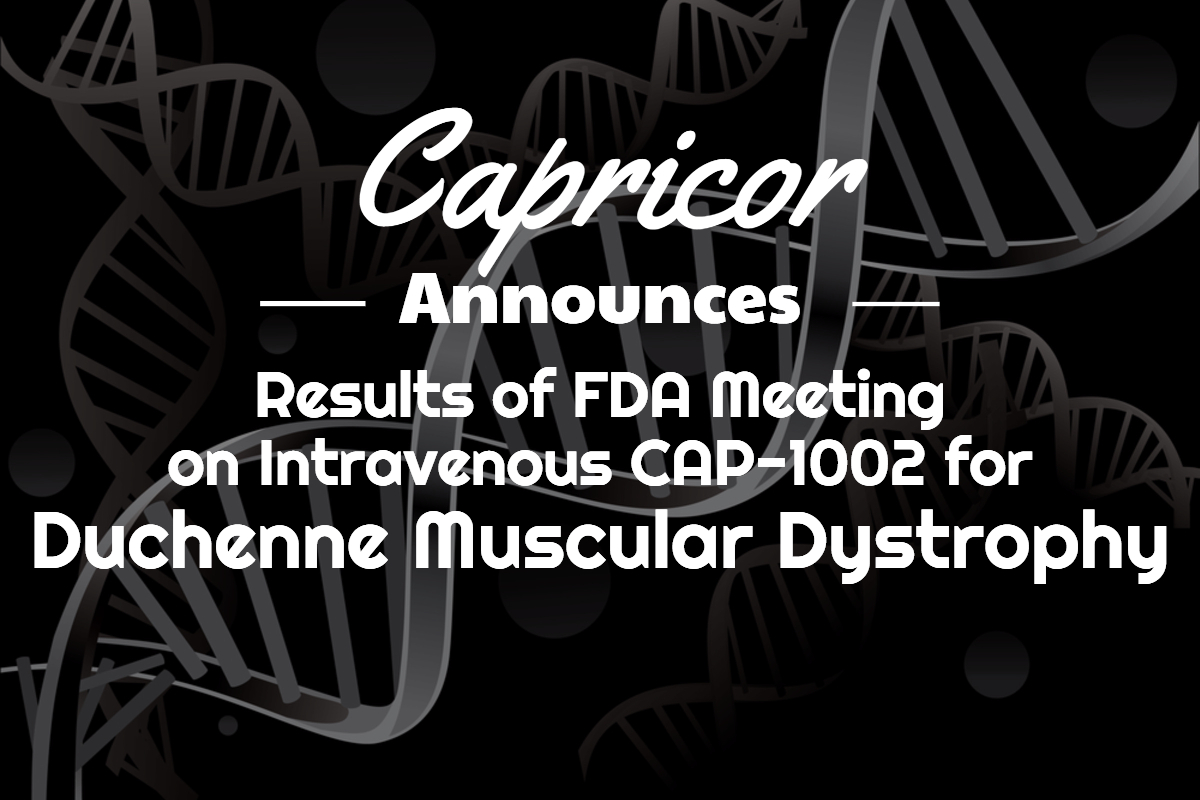 LOS ANGELES, July 27, 2017 — Capricor Therapeutics, Inc. (NASDAQ: CAPR), a biotechnology company developing biological therapies for Duchenne muscular dystrophy (DMD) and other rare diseases, today announced that it has received official minutes of the meeting held recently between the U.S. Food and Drug Administration (FDA) and Capricor to discuss the development of intravenous CAP-1002 (allogeneic cardiosphere-derived cells) for the treatment of Duchenne muscular dystrophy (DMD).
LOS ANGELES, July 27, 2017 — Capricor Therapeutics, Inc. (NASDAQ: CAPR), a biotechnology company developing biological therapies for Duchenne muscular dystrophy (DMD) and other rare diseases, today announced that it has received official minutes of the meeting held recently between the U.S. Food and Drug Administration (FDA) and Capricor to discuss the development of intravenous CAP-1002 (allogeneic cardiosphere-derived cells) for the treatment of Duchenne muscular dystrophy (DMD).
The minutes indicate:
- FDA’s willingness to accept Capricor’s proposal to use the Performance of the Upper Limb (PUL), an outcomes instrument that was specifically designed to assess upper limb function in ambulant and non-ambulant patients with DMD, as the basis for the primary efficacy endpoint for clinical studies intended to provide substantial evidence of effectiveness of CAP-1002 in support of a Biologics License Application (BLA);
and, - Sufficiency of the existing nonclinical safety and efficacy database to support submission of an Investigational New Drug application (IND) to clinically evaluate repeat intravenous administration of CAP-1002.
Capricor has reported positive six-month results from the ongoing randomized Phase I/II HOPE-Duchenne clinical trial of CAP-1002) in 25 boys and young men with DMD, in which patients treated with CAP-1002 demonstrated statistically-significant improvement compared to usual care control in certain measures of upper limb function as assessed by the PUL, as well as in certain cardiac functional measures. CAP-1002 was generally safe and well-tolerated over the initial six-month follow-up period.
 “The FDA’s response to our proposed clinical development plan supports our near-term objective of submitting an IND for intravenous CAP-1002 as well as provides us with clarity on a path to potential product registration,” said Linda Marbán, Ph.D., president and chief executive officer of Capricor. “We look forward to commencing a randomized, double-blind, placebo-controlled Phase II clinical trial of intravenous, repeat-dose CAP-1002 in boys and young men with DMD in the second half of 2017, subject to regulatory approval.”
“The FDA’s response to our proposed clinical development plan supports our near-term objective of submitting an IND for intravenous CAP-1002 as well as provides us with clarity on a path to potential product registration,” said Linda Marbán, Ph.D., president and chief executive officer of Capricor. “We look forward to commencing a randomized, double-blind, placebo-controlled Phase II clinical trial of intravenous, repeat-dose CAP-1002 in boys and young men with DMD in the second half of 2017, subject to regulatory approval.”
“The cells in CAP-1002 release exosomes that are immunomodulatory and exert anti-inflammatory, anti-fibrotic, and anti-apoptotic effects. By ameliorating the myocyte damage induced by dystrophin mutations, our product has been demonstrated to preserve and improve the structure and function of dystrophic skeletal muscle. Its differentiated mechanism of action supports its potential to be a standalone therapy as well as an adjunct to dystrophin-modulating agents,” added Dr. Marbán.
About CAP-1002
CAP-1002 consists of allogeneic cardiosphere-derived cells, or CDCs, a type of progenitor cell that has been shown to exert potent immuno-modulatory activity. CDCs have been the subject of over 100 peer-reviewed scientific publications and have been administered to approximately 140 human subjects across several clinical trials.
About Duchenne Muscular Dystrophy
DMD is a genetic disorder characterized by progressive muscle degeneration and weakness. It is caused by an abnormality in the dystrophin complex, a structural element that plays a critical role in muscle fiber integrity, which leads to chronic muscle damage. Patients with DMD typically die in their twenties, most commonly due to heart disease. The incidence of DMD is estimated to be one in every 3,600 live male births, and DMD is believed to afflict approximately 15,000 to 20,000 boys and young men in the U.S.
About Capricor Therapeutics
Capricor Therapeutics, Inc. (NASDAQ: CAPR) is a clinical-stage biotechnology company developing first-in-class biological therapies. Capricor’s lead candidate, CAP-1002, is a cell-based candidate currently in clinical development for the treatment of Duchenne muscular dystrophy. Capricor is also exploring the potential of CAP-2003, a cell-free, exosome-based candidate, to treat a variety of disorders. For more information, visit www.capricor.com.




















Tell Us What You Think!